New York City’s Pennsylvania Station, I am told, is the busiest in the western hemisphere.
Amtrak does not own the rails its trains travel, but it owns Penn Station. From here, twenty-one tracks lead to seven tunnels which lead to the rest of the country. Somehow, more than 600,000 people move through this space every day.
The space is functional, efficient, smooth.
It’s also not very pretty.
To be fair, I do know a new station is on the way. What will be called the Moynihan Train Hall is under construction across the street, inside the old Post Office. And if the artist renderings and projections are true, it will be grand and airy, light-filled and impressive, huge in the way that trains deserve.
The current station, though, the one under Madison Square Garden, is sad and cold. I cannot say it’s sterile, but even the dirt is unremarkable. Every day here is like every day here. There is no invitation to linger or admire. Nothing, not even the kitsch, claims this is a real place on the map. The point of being here is to be leaving.
It hasn’t always been this way. The original station, the one torn down in 1963, had arched ceilings of glass, exposed pillars of steel. The waiting room was the largest indoor space in the city. The exterior had a colonnade, grand steps, a sense of style. It was huge. It was breathtaking in the real sense of that term.
I never saw it, of course. In 1963 I was five years old and my family lived outside of Chicago. But I have seen the pictures and wished.
Art historian Hilary Ballon said, Penn Station did not make you feel comfortable; it made you feel important.
A New York Times article had the headline: “When the Old Penn Station Was Demolished, New York Lost Its Faith.” That article, by Michael Kimmelman, goes on to say:
The building that opened in 1910—its concourse longer than the nave of St. Peter’s in Rome, its creamy travertine quarried, like the ancient Colosseum’s, from Tivoli, its ceiling 138 feet high, its grand staircase nearly as wide as a basketball court—was a “beautiful Beaux Arts fortress,”…Penn Station had its fancy portes cochères for the railroad’s well-heeled customers, and 84 huge, somber Doric columns, with 22 roosting eagles guarding the entrances…Inside and out, the building was meant to be uplifting and monumental—like the Parthenon on steroids—its train shed and waiting room a skylit symphony of almost overwhelming civic nobility, announcing the entrance to a modern metropolis.
The current space speaks nothing to grandeur or romance. In the Acela club lounge where sleeper car passengers wait for their trains among well-dressed businessmen and women, among high fashion tourists and a handful of college kids in torn jeans and t-shirts, I listen to the staff discuss the important issues of the day.
“Goku and Gohan were awesome.”
“I liked Piccolo.”
“Piccolo was evil, man. Like Vegeta.”
“Yeah, but a cool evil.”
Then a non-sequitur.
“Did you know Pikachu was a mouse?”
I suppose it all makes sense. The point is to not be here.

Yesterday, when the Crescent arrived, I had a decision to make. My hotel is about a mile from the station. I’ve been here before. A taxi-ride can take longer than walking.
The rain had stopped, but the sky looked heavy.
I decided to walk.
Half-way to the hotel, the skies decided to rain. First just a humid mist. Then a downpour.
I ran from awning to awning up the east side of 8th Avenue until it didn’t matter. I was drenched in warm summer rain and, frankly, happy. The hotel desk clerk didn’t look surprised.
I cleaned up and met old friends for lunch, then went back to the hotel for a nap before an evening walk to go exploring, only to discover the restaurant I wanted to visit was closed for a private party. But I have a particular love for street food, so I can say I ate well.
Early back to the hotel and bed, I kept reminding myself that I wasn’t here to visit New York. In the morning, I slept late.
Now, however, it’s 3:45 in the afternoon and I am once again on a train. A small boy in a paper conductor’s hat helped a real conductor welcome people, scan tickets, give directions. The boarding adults paused, asked him questions, gave him an honest thank-you.
“Thank you, sir,” I said.
“You’re welcome, sir,” he said.
His was a serious joy.

If I weren’t looking out the window, settled in my room, I would not notice we’ve begun moving. Slowly, though, I watch the platform recede. We come out of some midtown tunnel and the buildings of Manhattan parade in afternoon light.

This time I’m on the Lake Shore Limited, heading upstate and then over to Chicago. We will cross the Harlem River to leave Manhattan, then up the east side of the Hudson, change back to diesel locomotive at Croton-Harmon, pass West Point and Bennerman’s Castle. On to Albany, Syracuse, Rochester, Buffalo, Erie, Cleveland, Toledo, South Bend, Chicago. On to Erie Canal, Mohawk River, Lake Erie, Lake Michigan. Beautiful country. Rust belt, too. Hudson River school of painting. Urban blight. For a thousand reasons I’ve traveled this country by car for years. I’ve seen all of this. But I’ve never had the chance to look closely.
The George Washington bridge comes first.

Then the Tappan Zee.
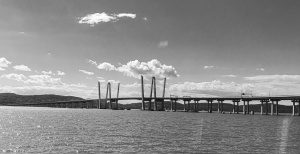
Then hours by the Hudson River, camera in hand.



Idyllic today. Yet, there have been wrecks along this line.
There was a crash at Spuyten Duyvil, where Manhattan meets the Bronx, in 2013. The engineer was speeding. Four people died.
There was a crash at Spuyten Duyvil in 1882 as well, near a hairpin curve, where one train stopped for repairs and another, speeding, came along the same tracks. Twelve people died.
There was a crash at Garrison in 1897, which killed 19 when the embankment under the rails gave way and sleeper cars rolled into the river.
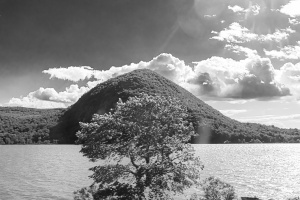
There are other stories, too.
Trains of nothing but black oil tanker cars, loaded in western North Dakota, have been called “bomb trains.”
The Poughkeepsie-Highland bridge, when it opened in 1889, was the longest bridge in the world. In WWII it was painted black to defend against air attack. It caught fire in 1974 and was reopened in 2009 at The Walkway Over the Hudson State Historic Park, part of the Hudson Valley Rail Trail Network. It’s in the Rail-Trail Hall of Fame. More than 500,000 people walk the just-over-a-mile span each year.
You can’t see history. But history can change how, if not what, you see. This afternoon, what I see through my window is the inspiration for Hudson School paintings. Summer afternoon light fading to twilight. Shimmering, pearlescent water. Cottonball clouds. Green forested hills. Haze as soft as a child’s blanket.



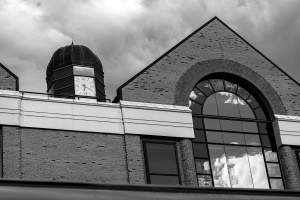
There is no dining car on the Lake Shore Limited. Just a café/bar car now. I am served what is, essentially, a microwaved boxed meal. The chicken penne alfredo is not bad, nor is it good. It is irrelevant, as interesting as taking a pill. The salad is microscopic.
There are no reservations. There is no service staff. There is no meeting of strangers and then the usual questions that lead to something more. No fast friendships. All that kind of elegance is missing. My small bottle of cabernet is a dollar more on this route. And the cup is just a clear, plastic, Solo cup. The other routes had plastic cups too, but at least they were shaped like wine glasses.
I understand the value of efficiency and cost-effectiveness. Yet, both can be sins, too. There is a value to style and there is something sad when it goes away.
Then again, there is profound beauty on this route, too. The scenery going up the Hudson is gorgeous. The hills on the west side grow closer.
North of Poughkeepsie, I meet the car attendant and tell him I am in love with the passing scenery. He tells me my first glass of wine is free.

Leaving Schenectady and crossing over the Mohawk River, traveling what I believe is over 100 miles per hour, we pass a man tending a fire in a back yard. I don’t think it is a grill. I think it is pile of leaves and twigs and such. He is standing there with a rake. American Gothic. All very nice. All very pretty. He waves, energetically, at the passing train.
For the first time, I feel a bit of regret, a bit of nostalgia. This train is heading toward home now, which means it’s nearly over. And I am aware of what I’ve missed. At 100 miles per hour, I have a second and a half from the time something appears in my window or field of view until the time it disappears. Sometimes I simply cannot get the camera up and focused fast enough. I call out loud. One Mississippi, two Mississippi. That’s how much time I have to recognize, frame, compose, focus, and shoot. But the eye is its own recorder.
I decide to make a section in my notes: things I did not photograph because they went by too fast or I was unprepared. Or because it took me too long to get over the knee-smacking awe of what I was seeing.
- Man tending a fire in Schenectady.
- Golden, shimmering daylight in the mountains of upstate New York.
- The VFW wall back in Devil’s Lake.
- Homeless camps in California, men sleeping within inches of the railway.
- Wedding on the beach.
- All sorts of people waving at the train.
- Josh’s duct-taped door.
- The Rocky Mountains at night.
- The Pacific Ocean at night.
- Steak and crab cakes for dinner.
- The look on Vanessa’s face at the Old Ice Cream shop in Benson.
- New Orleans.
- That kid in the paper conductor’s hat.
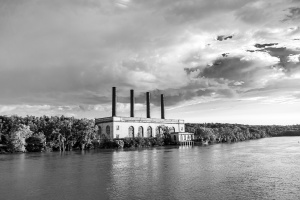
Early evening, sun low enough it’s beginning to be difficult to see what’s outside, I talk with our car attendant, Kenny. He stands in my doorway as shadows flicker the room.
“I’ve been listening to you,” I say. “You do a fantastic job checking people in. You’re all tea with honey, princess and the pea stuff. Is this just who you’ve been your whole life?”
Kenny looks out the window for a moment.
“For a long time,” he says, “I’ve been deprived of being that person. Upbringing was incredibly hard for me. Born in a town called Lakeview, Long Island. Mom was out there. Never knew dad. Hard life. Really hard life. Lot of in the house alone. It was like I was never able to let loose. And as I got older, I found new vices to let loose. Music and building bikes and like that. With all those restrictions growing up, I found a way to make myself happy. Being a people person is really cool for me.”
“How old are you now?” I ask. “You’ve got a little bit of grey sneaking in there.”
“I’m 43,” he says.
“And Amtrak is your life-long dream?” I ask.
“I was on tour,” he says.
“Military?”
“No. With music.”
“Ok,” I say. “That’s not a natural connection.”
“I’m signed to Chuck D from Public Enemy. I’m the lead of a group called Kendo the Almost Famous. So, I’m on tour. I’m in Tokyo. And I just get off stage with Little Wayne and Public Enemy. I was the opening act for about 15-20 thousand people. An event called the Fujifest. I just got off stage. We go back to the hotel. And we get our pay. So I’m sitting there with a wad of money and have no idea what to do. I already had two cars. I didn’t know what to do. I go on line and as I’m scrolling there with my computer, something, it might have been Facebook, said Amtrak! And I’m like, that would be kinda cool. I like to travel.”
“Why not stay with music?” I ask. “Why not find another gig, then another gig, then another gig?”
“The music is cool but I felt like it was something I already conquered. I got a gold record. So, it was like, I already conquered it. It already did what I wanted it to do. I’m the kind of person that if I’m doing something, I’ll exhaust it and then move on.”
“So I go online,” he continues, “in my room, with my computer, and I apply. Just bullshitin’ around. I got a pocketful of money, I’m still on tour, my record’s doing well. And they call me. Two months later they call me. And I’m like, what’s up? They’re like, ‘we see you’re interested in a position.’ And I’m like yeah, whatever. And they say follow the instructions online, so I did so. I’m like, I got a show tomorrow. But I’m taking this adventure because I don’t know where it will take me. A week goes by. I do the show. I come back. I’m sitting at home with my computer again and it says orientation class starts at… Holy! So I got to call Chuck. I have to call these guys and say hey I just got a job. They’re like, what? I’m like yeah, I’m going to see where it takes me. Chuck D is so cool that he’s like a big brother. He says if you want it, go for it. Be the best at it. You can still always come back and do music. You’re already solidified as a great artist. Next thing I know, I’m sitting in an orientation classroom!”
“So, I go and I do the orientation. Next thing I know, we’re training on the road. And I started to incorporate the way I dealt with people on stage, when I’m on stage performing, to the way I’m dealing with people, the personal connection, and it works. And the feedback is so good that I continue. And as I continue, four years ago, it snowballed into here I am.”
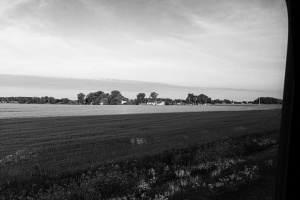
“It’s cool, man,” he says. “And I started to really get into the job. Go a little farther. I started treating people the way I would want my Mom to be treated, or my family.”
“Do you have a family?” I ask. “Wife? Kids?”
“Yeah, I have a wife. Girlfriend, soon to be wife. And I have three little girls. One step-daughter and two daughters. So it’s all good. Sixteen, seventeen and eighteen.”
“Sorry, man,” I laugh.
“It’s a wake-up call,” he says. “It makes you internally protective and regret the things you used to do.”
“We were all sixteen,” I say.
“Three girls. Soon to be wife. Life is great. I am working for Amtrak. As far as retiring from Amtrak, I’m not sure because with the music money and the Amtrak money I started a bicycle company. Line 3 bikes. Line 3 makes track bikes. Single speed. You’ve seen those guys in the Olympics? So right now, between Line 3 and Amtrak, Amtrak is the breadwinner. But the bike company is catching up.”

Kenny gets called away and I watch the evening turn into night, both amazed and content at the same time.
A short while later, he is back at my door.
“Ok, you wanted a story,” he says. “I’ll give you a complicated one. You’ve got a guy on the train. Not this one. Not now. This was a while back. You can tell he’s ex-military because he’s got all the flags and medals and things. The little bars. When he comes on he’s kind of quiet. I don’t know if there’s PTSD or anything, but he’s really quiet. And I noticed it.”
“He’s like yo, I want to sit here. He’s sitting way in the back, away from everybody. That’s cool, I say, if this is where you want to sit. I’m thinking if he’s a little upset or something, this is a good place for him to sit. The rest room is right here. But as I’m going through the night, I can smell the alcohol from his seat. So, there’s a bottle. When he goes to the bathroom he leaves the bottle. When he comes back, I’m like, ‘Guy, I’m at work. I don’t want to make it hard for you, not for myself either, but you can’t drink here. So cap the bottle and open it when you get off. I’m not going to take it from you.’ In my mind, I’m thinking I don’t want to cause that problem. And he’s like aw aw aw alright. But he gets a little feisty. So, I dial back a little bit. I know he’s either intoxicated or something. But when I start to walk away, he starts cussing me out. ‘You motherfucker…’”
“And I’m like, oh man. Now I have to turn around because a lot of the passengers are looking over their seats. So, I go back. You okay? ‘No,’ he says, ‘You told me I couldn’t drink from my bottle’ and I said to him, ‘Guy, you’re making it worse. Listen. If it continues, I’m going to have to have you pour it out. And if you can’t pour it out, I’m going to have to go get the head guy. And I don’t want to have to do that because it looks like you’re having a hard week. ‘”
He starts to get all emotional and I come to find out he just lost one of his buddies he was in the war with. Then he throws the bottle down the aisle. I don’t know how it didn’t hit anybody. But it went straight down the aisle and hit a door. He’s at the back. Next thing you know, I say to him, ‘Listen. The next stop is yours.’ He’s ‘why are you doing this to me? Why are you treating me like this?’ I’m like, ‘Guy, it could have been a kid that stepped out of that door and you hit him with a bottle So I’m going to talk to my guy and I think the next stop is going to be yours. The next stop is Albany, so you can find another train or another way, but I don’t think they’re going to let you.’”
“Albany came pretty quick and the guy was taken off the train. And when it was all over, the head guy comes to me and he’s like, ‘Kenny, I like how you handled that.’ Listen, I know the guy was going through something, but it was really hard to put him off, to bring that to everyone’s attention. I tried to keep it as quiet as possible and that was a hard thing for me.”
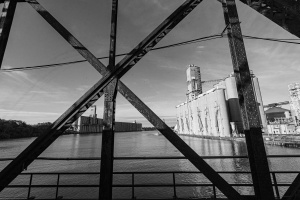
Tell me a sweet story, I say. Somebody getting engaged or married or something.
“There’s a lady who travels back and forth,” he says. “She has cancer. She travels from Syracuse to Chicago. I see her pretty frequently. But now it’s gotten to a point where she’s gotten so thin and frail that she’s losing her hair. She wears a scarf now. Her name is Mary. That was easy to remember. I’m like ‘Mary, how you doin?’ And she’s like, ‘Do I know you?’ She is kind of out of it from the chemotherapy, I think. But she always kind of comes back. ‘Do I know you? Yeah, I’m Kenny. I helped you out before.’ ‘Oh my god,’ she says. ‘Kenny! Kenny!’ I reach to hug her and she starts crying. I think our conversation, me speaking to her throughout the trip, helped her this small portion. Those are the things that keep me going at Amtrak.”
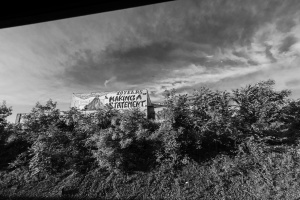
I ask him to tell me a story I haven’t asked about.
“I have a strong story,” he says. “This is serious. I’m going to word it to you exactly as it happened. The other day, we stopped in Utica. And a guy came to the train. He was walking behind two girls. And when the girls got to the train, I said ‘Where you guys goin?’ The girls were like, ‘Oh we’re going to New York!’ I’m like, ‘Okay!’ The guy came to the train, got up on the step box, and I said ‘Hey Pop, How ya doin?’ Little old gentleman. I said, ‘Where ya goin?’ And he said, ‘On the train, nigger.’”
“The girls were at the top of the steps. They were white girls and they looked back like ‘What’d he just say?’”
“I found the gift deep inside me to not flip out. Because when he said it, I told him. I said, ‘Look, I’ll give you two options. Number one, you can step back off this step box before you step on the train, under your own human power, and go back to the station. Or, you can step onto the train where anything can happen. I’m giving you an opportunity to use your own human power to walk back to the station. And when you get back, and they say ‘Hey, why didn’t you get on that train? The next train doesn’t come until tomorrow night.’ I want you to tell them that the nigger said you couldn’t ride this train. Make sure you tell them that. The story wouldn’t make sense if you don’t.’ He was like ‘ahhhh…,’ so he went back. And he was looking back at me as if I was angry. I wasn’t angry. And when one of the conductors walked up, one which the old guy told his story to on his way back, he’s like ‘Kenny, are you alright?’ I’m like, ‘I’m fine. It’s fine.’ ‘Listen,’ he said, we should report that guy.’ ‘No,’ I said. ‘We shouldn’t. It’s done.’”
“Lucky he ran into me, because if he had run into someone else who wasn’t thinking right, it would have been different. And I’m not mad. I still come out here and help as I can.”

Kenny makes his rounds. Outside, it’s become too dark to see. Railroad crossing lights flash by. Headlights from cars and trucks go by, the distant light from small towns seem like an invitation. Then he’s back.
“I got one more story for you,” he says.
“Go for it.”
“We were going up to Boston. There was a kid walking on the tracks, headphones on. The train hit him. Kills him. The train was like maybe forty yards from the station platform. And people on the edge of the platform start taking pictures! People on the train, looking, start taking pictures! And I’m sitting there saying this is somebody’s son! This kid is about 15 years old and he looked like he had his life together. Headphones and sneakers, everything looks good.”
“If he’s that close to the platform, I ask, how come the engineer didn’t see him?”
“I don’t know,” he says. “But it hit him. It was right outside of the Springfield station. And I’m just sitting here losing it, saying, despite everyone taking pictures, someone has to call his parents! You guys understand that?”
“But I think that’s because I have girls,” he says. “I have children.”
Is this the only one, or have there been others, I ask.
“There have been others,” he says, “but I didn’t go outside to see.”


In the sleeper car, if there are other passengers I would not know it. All the doors are shut. All the curtains drawn. Evening becomes night and once again the rolling of the train is a comfort to sleep, the doppler sound of bells at railroad crossings, the faraway engine horn like an old voice. I am only vaguely aware of Rochester, Buffalo, Erie, Cleveland, Elyria.
My wakeup look out the window is disconcerting. The water, what I think is Lake Erie, is on the wrong side of the tracks. Turns out to be Sandusky Bay. Still a mostly full moon.
When we stop in Toledo, a new conductor walks by and says, “Good Morning, Mr. Olsen. How are you? Beautiful morning.” And I agree. Birdsong in the air.
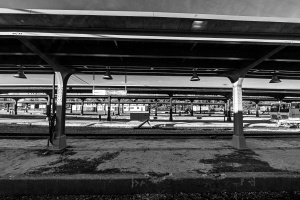
A trainload of Boy Scouts gets on in coach, all of them in their brown shirts and scarves, all of them wearing backpacks. Lots of dads, too. Looks like the beginning of a camping trip.
We leave Toledo at 7:15 in the morning. And then we stop.

We sit. And sit. And sit. Then we rest. Then we wait. Then we sit some more.
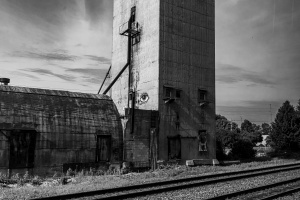
Waiting for freight traffic to pass us by, I am worried about my connection in Chicago. Only a couple hours separate the arrival of this train and the departure of the Empire Builder heading toward Fargo. If I miss it, I have no hotel room booked.
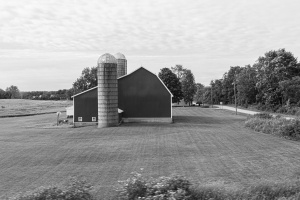
We get rolling again. I get ready to dash from one train to the next.
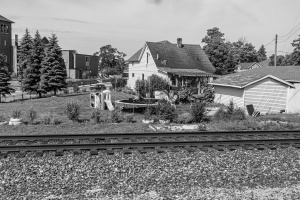
Somewhere in Ohio, a picture I did not take: a street fair just getting setup in the early morning.
A picture I did not take just outside Elkhart, Indiana: a Little League morning. Four fields all filled with pee wees.
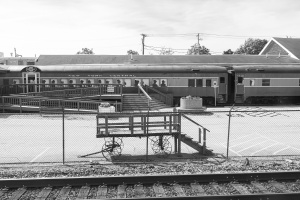
Breakfast is sweet banana bread or blueberry muffin, made a thousand years ago, wrapped in plastic wrap. Cartons of juice-like liquid. The kind of stuff you can get out of a vending machine.
It has none of the flavor or atmosphere of a real meal. Certainly none of the good humor and comradery of breakfast on the other lines. No table service. No joking. Not because the people are any different, though. And not because the staff is less friendly. The difference is that people on this train are going somewhere. Here, the train is just the vehicle to get there. On the other lines, the train is the place they are going.
We pass through Bryan, Ohio, where the Etch-a-Sketch was invented.

We crawl through Waterloo, Indiana, where a complete mastodon was unearthed.

We gain some speed and then we do not.

Kenny walks by. “Good Morning!”
“Any stories?” I ask.
“Nah, peaceful night,” he says.
“You take care,” I say. “Good luck with the bikes and the family.”
He shakes my hand, earnestly. “You, too,” he says.
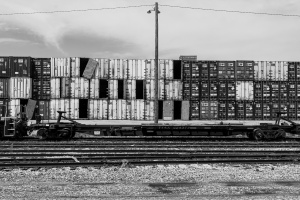
Chicago. Home ground. Plenty of time.
Previous: The Crescent Next: The Empire Builder Redux
